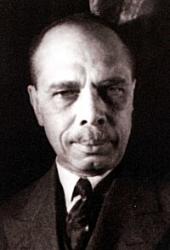- |
User Links
James Weldon Johnson

www.hymntime.com/tch/
| Short Name: | James Weldon Johnson |
| Full Name: | Johnson, James Weldon, 1871-1938 |
| Birth Year: | 1871 |
| Death Year: | 1938 |
James Weldon Johnson MA PhD USA 1871-1938. Born at Jacksonville, FL, he attended Clark University, Atlanta, GA, and also spent three months in the backwoods of Georgia., taking in the culture there. While in school he published a paper, ”The daily American newspaper”, which ran for a year until terminated for lack of funding. He graduated in 1894. He then taught at the largest school in Jacksonville, FL, eventually becoming principal and adding 9th & 10th grades there. While there he began preparing for the FL bar exam, taking it in 1897. In 1904 he became treasurer of the Colored Republican Club, becoming its president the following year. He became an author, activist, educator, lawyer, and diplomat. A musician from youth, he collaborated with his brother, Rosamond, also a musician, and Bob Cole to write Broadway songs, and they achieved some success. They also wrote an opera, “Tolosa”, satirizing the U.S. annexation of the Pacific islands. He became a writer and Civil Rights activist. He did the editorial page of the New York Age, an African-American newspaper. In 1916 he became active in the NAACP, and in 1917 he added many chapters to its southern membership. He was its executive secretary (essentially its operating officer) from 1920-1930. He was involved in the campaign to pass the Dyer Anti-lynching Bill. He wrote poems, novels, and anthologies, and collected poems and spirituals from black culture. He wrote the lyrics to the Negro National Anthem, “Lift every voice and sing”, in honor of Booker T Washington, who visited his school and heard the poem recited by 500 school children in his presence, paying tribute to Abraham Lincoln’s birthday. He participated in Theodore Roosevelt’s successful presidential campaign, and was rewarded by receiving an appointment as U.S. Consul to Venezuela (1906-1909), and later to Nicaragua (1909-1913). He married activist,Grace Elizabeth Nail during this period. They had collaborated on a screenwriting project. They had no children. In 1930, after years leading the NAACP, he became professor of creative literature and writing at Fisk University ( a historically black university), Nashville, TN, where he lectured on a wide range of issues. In 1934 he was the first African-American professor hired at New York University, where he taught several classes in literature and culture. He published four works: “Autobiography of an Ex-colored man” (1920) “The book of American negro poetry” (1922/1931), “God’s trombones” (1927), and “Along this way” (1933). In 1938 he supported efforts by Ignatz Waghalter, a Polish-Jewish composer who had escaped the Nazis in Germany, to establish a classical orchestra of African-American musicians. He perished at Wiscasset, ME, while on vacation when the car his wife was driving was hit by a train. She was severely injured, but recovered. More than 2000 people attended his funeral. Several universities named buildings or departments in his honor, as is a community library in St. Petersburg, FL. In 1988 a U.S, postage stamp was printed in his honor.
John Perry
Access an additional article on the Canterbury Dictionary of Hymnology:
| Texts by James Weldon Johnson (6) | As | Authority Languages | Instances |
|---|---|---|---|
| Come, ye saints, give honor to Jesus who leads the way | James Weldon Johnson (Author) | English | 1 |
| In the dawn of life's bright morning when the heart is glad and light | J. W. Johnson (Author) | English | 1 |
| Lift every voice and sing | James Weldon Johnson (1871-1938) (Author) | English | 53 |
| Prayers | James Weldon Johnson (Author) | English | 2 |
| വാനഭൂ എല്ലാടം ഉച്ചത്തിൽ പാടീടാം (Vānabhū ellāṭaṁ uccattil pāṭīṭāṁ) | James Weldon Johnson (Author) | Malayalam | 1 |
| When blessings are crowning my days | J. W. Johnson (Author) | English | 1 |


 My Starred Hymns
My Starred Hymns

